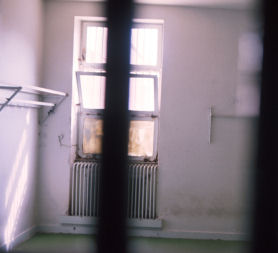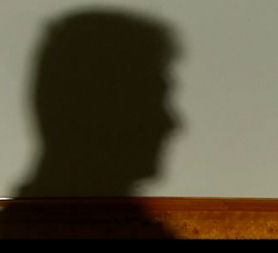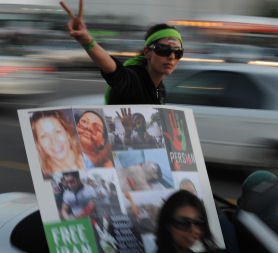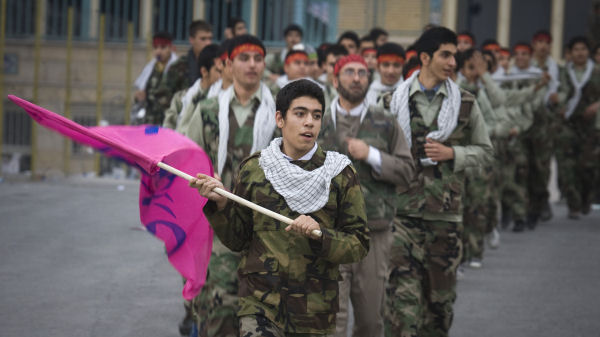Basij militia man jailed: full transcript
 Lindsey Hilsum
International Editor
Lindsey Hilsum
International Editor
The full interview with a former member of the Iranian Basij militia, who describes his mistreatment in jail for refusing to assault opposition protesters.

Warning: the following testimony contains details of violence and sexual assault.
“On that day it was one of the major protest days on which many people were arrested. There were people of all ages. Then we organised them by age, taking down all their details, names, addresses. They were then held in containers for up to 24 hours before being taken to prisons.
“I encountered 13 and 14-year-olds and upwards.
“With the connections that I had, I had requested a different post. With the history of my activities with them and their familiarity with me and the trust they had in me, they gave me a role there. Because I had good handwriting and office experience I was put in charge of writing down the particulars of all the detainees.
Click here: what is the Basij?
“All those who were brought there were terrified and bewildered. It was a very particular atmosphere. Things proceeded stage by stage.
“The atmosphere was truly difficult.
“With the utmost disrespect and the utmost violence the detainees were thrown into containers.”
‘Kids naked outside’
“That night after dinner one of the guys and I went outside to smoke a cigarette. Four of us went out the back. We took a torch with us. As we got outside we heard strange noises. The sound of screams and shouting.
“We set off towards the noise to see what had happened. We saw the door of one of the containers was open. A few of the officers were standing outside.
“We moved towards the containers. We saw one of the kids naked outside. I cast my torch into the open door of the container, I saw a group… this was the container with the underage children that they had arrested. All those under 14 were in there. With my torch I saw that there were others naked and I saw that the floor was wet.
“I somehow became involved in defence of this child who they were crushing, who they’d stripped naked”
“As I saw all this with my torch, one of the guards insulted me and told me to switch off the torch. He grabbed my torch and threw it across the yard and hit me. I thought I’d done wrong and didn’t say anything.
“Another of us was talking to the officer who was harassing the naked boy outside. He said ‘What do you want with this poor boy, this servant of God? How can he defend himself in his condition? Don’t you know God, aren’t you scared of God?, Why are you doing these things?’
“I somehow became involved in defence of this child who they were crushing, who they’d stripped naked.
“Things became heated and we were all involved and they summoned us to the commander. X was openly critical, he was very brave. I didn’t say anything. He was particularly brave. The discussion continued there, that what was this path that we’d taken, that is it an Islamic directive that people’s wives and children are being raped?

Torture and beating
“They arrested me that night and the next day put me in an individual cell, in solitary confinement. It was there that the torture and beating began.
“When they took me for interrogation they asked which group we were in, for whom we were spying saying ‘Who had directed your mission that night?’
“They even accused us of setting out to free the detainees, of setting out to disrupt everything. I couldn’t believe all this. I couldn’t believe what was happening, what they were saying. I couldn’t believe the insults, the beatings…
“When you see everything, hear the screamS and shouts, people crying out for help. Why wasn’t this happening in other containers holding people who were older? Why was the floor of the container wet? We didn’t have a hose there. All this together. It wasn’t blood. All this together…
‘I thought I had gone blind’
“During the interrogation I told the truth, explaining that it wasn’t as they said. But they told me their version. After a few days I realised… following pressure… after the beatings, after the torture, that they what they were after was my confirmation of their version.
“They told me that if I confirmed their story and confirmed that I was spying, that I had joined the Basij with the intention of undertaking such activities and harming the order, that if I confessed and went along with them and signed, that I would be freed. Unfortunately, my personal endurance was not more than this, I couldn’t take any more.
“Their treatment of me… even though I was high-ranking in the Basij and had a long history of activity… I never expected to be spoken to in such a way, let alone insulted and sworn at, hit, kicked.
“The first time they took me for interrogation they struck me so hard in my left eye that I couldn’t see for a while. After the second day I could see a little, I thought I’d gone blind in my left eye. I still have problems with it, it’s never returned to normal. Those who torture you are well built. They have strong hands and strong bodies.
Execution scenarios
“They created execution scenarios. They said we’re going to kill you and we’ll link your death to the protests. We’ll say that you were killed during a protest.
“There was a table on which I stood for some hours with my hands tied and a rope around my neck. They came a few times and said they’d come to execute me now, or in an hour. I was very worried.
“Then they came and pulled the table away. I fell. I thought I was saying goodbye to this world.
“It was as if I was fading. When they pulled the table, the rope wasn’t attached to anything. I fell backwards, and fainted. When I came to I was wet. They had thrown water over me. I vomited. They took my confession then and I signed. I can scarcely believe all this now.
“This all happened in the first week.
“There was a table on which I stood for some hours with my hands tied and a rope around my neck. They came a few times and said they’d come to execute me now, or in an hour. I was very worried.”
100 day detention
“I was held for around 100 days. My family didn’t know where I was but then through the people we knew they found me and put up bail and I was released. [They put up [a bond] the deeds of the house.
“I was in an individual cell but they later took me to a larger cell that I shared with my friend.
“I still feel responsible. It was me who recommended him to this Basij operation.
“He is someone whose family for generations had served honestly in the mosque. An excellent guy, a pure, humble person. I thought we could trust him and introduced him so that we would have good people among us. They were giving us 150,000 tomans to 500,000 tomans. I encouraged him.
“He had a wife, he had a child. He changed so much. All the torture, so many beatings.
“I wanted to help him, because I liked him. I wanted to give him a leg up. This was my intention, but unfortunately he became involved and was very disturbed by what he witnessed.”

‘Very far from Islam’
“We’re Muslims. Our religion is Islam. We recognise God. When you consider everything, in the end it was very different to all that they said. Those things were very far from Islam.
“Islam had become a curtain for them, from behind which they could do whatever they wanted.
“Directives were presented as the Islamic directives. Everything we say is Islam. You mustn’t question Islam. Disagreement with our directives is disagreement with Islam, in other words disagreement with God. We became like machines. They took away our personal control.
“I grew up in a religious family. As I child I was religious, it wasn’t just since before the elections or during the elections. These are our beliefs. I grew up in a religious family and reached the age that I could understand what was going on during the month of Moharram, the rituals at the mosque. When it came to Ramadan, I fasted. So I wanted to join the Basij.
“During Moharram, Ramadan, in these religious months they carried out responsibilities. When I saw these things it made me want to have Basij responsibilities. I loved Islam, I loved the supreme jurisprudence.
‘People’s organisation’
“It’s a people’s organisation, a civil organisation. I mean I think it was, although now I think part of it may have been the agenda of a particular group. You see it’s ordinary people who join the Basij.
“They enter the organisation of their own free will, because as I said it’s an organisation of the people, people join of their own will and their activities with the Basij are driven by their own desire, out of love.
“In Iran today it’s genuinely hard to find work, it’s hard to get into university. It’s every young person’s wish to enter university and continue his education to have a good life, to find a good job, to have wife, a house, a car. These were all things that they gave us with various methods.
“We felt good, we had a certain satisfaction. We noticed the differences. When I looked at my friends, they didn’t have the car I had, the job I had, the further education I had, that had come to me so easily. All through the Basij. That’s not why I joined. It was out of interest and love, but these were a support. They gave us hope. They were bonuses that encouraged us.
“I think these were things that they wanted to give us to trap us. So that we would be under their thumb. I think that’s exactly it. We would do whatever they told us.
“We grew up with this idea. I joined the Basij at an age that I was like putty that could be moulded. We grew up with these ideas. They gave us character.

Good intentions
“I believe that I didn’t join the organisation with bad intentions. Not just me, others too. Their intentions were good, to provide a service for people, rather than to get a bonus or perform their commander’s orders.
“I believe that there are people who are now full of regret, who are not able to express this regret and they are not able to leave the organisation. They [the guards] called me an outsider. I want to say that all those in the Basij are not bad people. We too are victims.
“I didn’t know the people who tortured me in prison. They were unfamiliar to me. I had come from outside the city. The people in my own town would have been familiar to me. I didn’t know the people who tortured me in that prison. Sometimes they would come with their face covered.
Sexual violence
“I didn’t know night from day when I was in solitary confinement. I was so disturbed that I couldn’t sleep at night from the pain. the pressure and stress.
“My friend who shared my cell created havoc. He’d never seen anything like this. Well, nor had I. He was in shock. He was confused. He lost control. He screamed and shouted, threw himself against the walls. The guards warned him that if he continued with this behaviour they would make things worse for him.
“He was under a lot of pressure. I haven’t experienced having a wife, but he was very close to his wife and he had a small child too.
“On the one hand the deception, on the other the torture he was subjected to, as well as his dependence on his family, all this caused him to lose control.
“He began screaming and shouting and swearing. No matter how I tried I couldn’t calm him. The guards came. One of the guards beat him. His face was bleeding… his clothes were torn off… The guard had a baton… he was sexually violated with it.”
‘Ashamed before God’
“One guard was outside, one inside the cell. I wanted to protest, to shout, to help him, but I had seen how they dealt with protesters and I couldn’t protest.
“I am thoroughly ashamed. I’m ashamed before God, ashamed of my youth, ashamed in front of my friend, ashamed in front of the people. I only thank God that during these arrests I never harassed anyone.
“There’s the poem that says ‘Human beings are members of a whole’. My friend, the people, myself, you, others, we are all one. Any one person’s pain can affect everyone, can disrupt calm.
“I have this terrible feeling of pain, that I spent the best years of my life unaware. They used this. I was a tool for them to reach their objectives. I unwittingly got involved in their plans. I was unknowingly led by them.
“Their slogan was that we were the force of the people, the eminent ones, that we must lead. We were unaware of what they brought on us. Our thoughts were not our own.
‘I hate their philosophy’
“Our religion is Islam, others may have other faiths but we are all of one God and that’s what’s important to me. I hate their philosophy, their organisation, their mobilisation, their way of thinking, their mode of management.
“I’m Muslim and I know myself, I believe in myself. I know that they took advantage of Islam.
“I am certain that when the Revolution took place and people lost their lives for it, that their aim wasn’t for a group of people to come to power to govern by manipulating people’s thoughts.
“When the revolution happened… the way I see it, we wanted to eradicate all oppression, we wanted to manage our own military, we wanted to govern ourselves.
“We wanted a government of the people, risen from the people, a product of the people, for it to recognise the people, to understand them and know what they had suffered. Not for their own interests. Not for them to put their own interests above those of the public.
“I am certain that when the Revolution took place and people lost their lives for it, that their aim wasn’t for a group of people to come to power to govern by manipulating people’s thoughts.”
‘I want Iran to be free’
“Life is a right that God has given us all. There must be a system in place for everyone to enjoy life and achieve God’s will. Not just to follow something blindly, but to be free, to have freedom.
“The system should be a people’s system, for it to care about people. All this in a great land, an extremely rich land, for it to have good standing in the world. To be proud to say Iran.
“To be acknowledged if I go somewhere and I say I’m Iranian, to be proud, not hide behind a curtain, not hate my Iranian identity. Not to say I’m Iranian and people respond saying ‘We saw your elections’, or if I say I’m Iranian, they say ‘You must be a member of Basij’, or if I say I’m Iranian, they say ‘You must be Muslim.’
“I want our Iran to be a free Iran. Here it’s a safe environment, but I’ve been torn from the arms of my family. That’s a basic right but it’s been taken away.
“I had been active in the Basij unit in the province, people knew me and believed in me.
“The way things happened, it was as though I had disappeared, no-one had news from me, so they came look for me. They set out to find what had happened to me and this eventually led to where I was held, and they negotiated my release.
“When I got out, I was in my mother’s care.
“I went to see someone for advice. He said there were two options. I could take the legal route and report all that had happened to me, to consult those already active and involved in the post-election rape cases, that they could pursue my case. This in itself was a risk.
“The very people I would consult were under surveillance. If I went to them there was the possibility of betrayal. You have to stand strong and fight to achieve your rights. Or I could go somewhere safe, to save my life for now and return once…
“I couldn’t tolerate any more. One prison experience was difficult enough for me.
“One of the human rights activists gave me an address of someone in Europe who could help me. I got in touch via the internet.
Revolution revisited: what has changed since 1979?
‘I was truly terrified’
“When I was released, they’d told me that I mustn’t contact anyone or tell anyone anything of what they had done to me. And after all their threats I had seen for myself that they meant it. I was truly terrified.
“I had seen that they carry out their threats to the end. I didn’t even go to a doctor because I wouldn’t have been able to explain what had happened, why I was at the doctor, what my ailment was.
“I would have had to have explained what was wrong.
“During this period I had to register with the local Basij unit once a week, to announce myself, that I was present in the area.
“I even lost my job, and all the bonuses they had given me over my years with the Basij, all the letters of recommendation that they’d written.
“They’d said that as soon as we know that you’re no longer active with us we will take away all these benefits. That’s one of the things that I’ve lost this year. Part of me says ‘so what, they can keep it’ but then I think I had to leave my country, be estranged from my family and far from my fiancee.”




